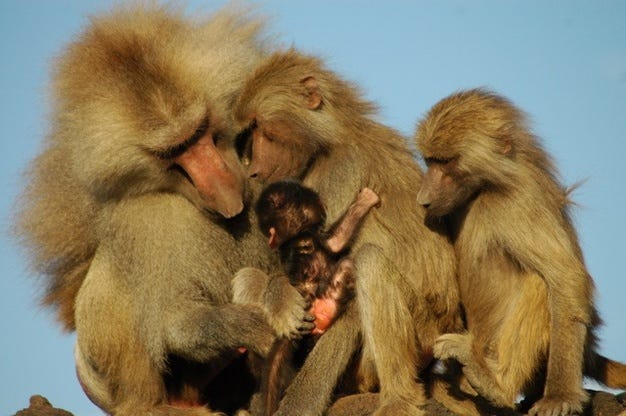The Genius and Joy of the Second-place Monkey
The "greatness dilemma" ain't much of a dilemma
There’s a very American truism that anyone who makes it to the top of their field must be maladjusted. To be “great,” at best you’ll have a wildly unbalanced life, at worst you’ll be an active menace to others. People with this view point at Warren Buffet’s or Steve Jobs’ “functional” psychopathy, or at Michael Jordan’s and Charlie Parker’s eventually-not-quite-so-functional one.
First, this is extremely debatable. If the notion of Steph Curry or Lebron James being in the same realm as Jordan doesn’t trigger you, you’ll notice that they seem to enjoy very un-Jordanly pleasant relationships with family and teammates. Meryl Streep has become the most accomplished film performer ever while maintaining a normal-ass personal life. David Lynch’s films are straight psychopathic, but he’s not–he’s a jolly dude who swears by meditation.
“But!” you may say, “these people are great, but they’re not #1 in their field! If we want to be the undisputed GOAT, we have to be willing to be maladapted!”
Let’s assume for a second that you’re right. This dilemma recalls an anecdote that’s stuck with me since long before Big Quit Energy, back when I was still a zealous work-humper. It comes from a book about the science of stress–Why Zebras Don’t Get Ulcers–that, in retrospect, may have been the first nudge toward the worldview I hold today.
A passage recounts a study of interactions among baboons who, like us idiot humans, are highly hierarchical and REAL MEAN to those who “rank low” in their society. Intuitively, the study found that baboons who ranked higher generally enjoyed a better life than those who ranked lower. But the experience of baboons who reached #1 in their troop compared to those who peaked at second were more surprising.
Presumably due to the demands of keeping everyone else dominated, baboons who “reached the top” experienced higher chronic stress, had worse health, and were more likely to die prematurely. Not to mention, once their inevitable fall came, other baboons made good on their harsh resentment against them, sometimes even ejecting them from the troop altogether.
The second-ranking baboons, on the other hand, were likely to live longer, had much better health indicators, and received relatively good treatment from the pack once their status declined. This is because these baboons tend to prioritize cooperation and social interactions over competing with others, more or less building their power and rank through consensus.
Being near the top, but not at the top, gives you the best of both worlds. Especially among humans, in fields that aren’t zero-sum (and most aren’t). Competent “also-rans” get to enjoy plenty of spoils AND live a holistic, well-adjusted life.
Don’t let work-humpers convince you otherwise.


